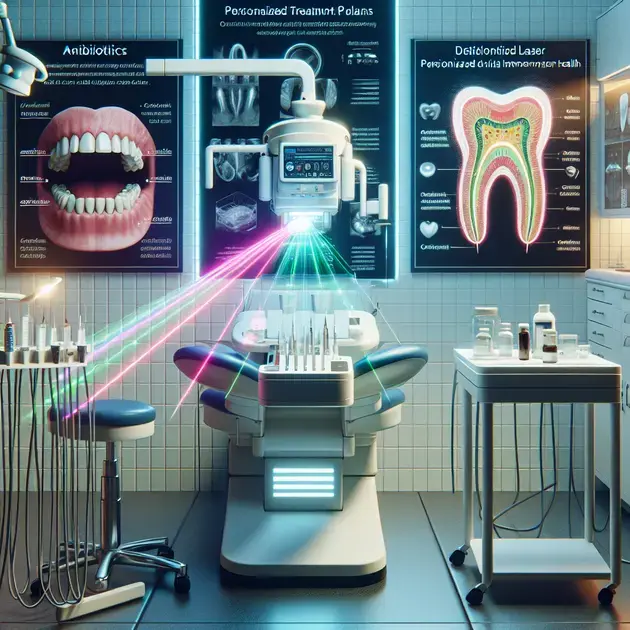Looking for the most effective medication for periodontitis? You’ve come to the right place. This comprehensive guide will provide you with all the information you need to understand and treat this common dental condition.
Periodontitis is a serious gum infection that damages the soft tissue and destroys the bone that supports your teeth. If left untreated, it can lead to tooth loss and other health problems. In this guide, we will explore the various medications available to help you effectively manage and treat periodontitis.

Choosing the Right Medication for Periodontitis
Choosing the right medication for periodontitis is crucial for effectively managing this condition. The first step is to consult with your dentist or periodontist to determine the severity of your periodontitis. Based on their recommendation, they may prescribe antibiotics to help control the infection. One common antibiotic prescribed for periodontitis is doxycycline, which can be taken orally to reduce inflammation and prevent further damage to the gums.
Another medication option for periodontitis is antimicrobial mouth rinse, such as chlorhexidine. This type of mouth rinse can help reduce bacteria in the mouth and prevent the progression of periodontitis. It is important to follow the instructions provided by your dentist or periodontist when using antimicrobial mouth rinse to ensure its effectiveness.
In some cases, a dentist may recommend a prescription-strength toothpaste containing fluoride to help strengthen the teeth and prevent decay. This can be used in conjunction with other medications to maintain oral health and prevent complications associated with periodontitis.
It is essential to adhere to the prescribed medication regimen and maintain good oral hygiene practices, such as brushing twice a day, flossing regularly, and attending regular dental check-ups. By following these recommendations and using the right medication for periodontitis, you can effectively manage the condition and improve the health of your gums and teeth.
Remember to discuss any concerns or side effects with your dentist or periodontist and seek their guidance on the best medication options for your specific case of periodontitis.
Understanding the Impact of Periodontitis Medications
Periodontitis medications play a crucial role in treating and managing the effects of this gum disease. Understanding the impact of these medications is essential for patients to take an active role in their oral health. Antibiotics prescribed for periodontitis, such as amoxicillin or metronidazole, target the bacterial infection causing the disease and help reduce inflammation in the gums.
One of the key impacts of periodontitis medications is their ability to control the progression of the disease and prevent further damage to the gums and supporting tissues. By following the prescribed medication regimen and maintaining good oral hygiene practices, patients can experience improved gum health and decreased symptoms associated with periodontitis.
It is important to be aware of the potential side effects of periodontitis medications, such as gastrointestinal upset or allergic reactions. Patients should communicate any adverse reactions to their dentist or periodontist promptly to address any concerns and adjust the treatment plan accordingly.
Regular monitoring and follow-up appointments with your dental provider are essential to evaluate the effectiveness of the medication and make any necessary adjustments. Patients should be proactive in discussing any changes in their oral health or symptoms with their dentist to ensure timely intervention and treatment.
Overall, understanding the impact of periodontitis medications empowers patients to actively participate in their oral health care and work collaboratively with their dental provider to achieve optimal treatment outcomes and maintain long-term gum health.

Understanding the Impact of Periodontitis Medications
When it comes to the treatment of periodontitis, medications play a crucial role in managing the condition and promoting oral health. Periodontitis, also known as gum disease, is a serious infection that damages the soft tissue and bone that support the teeth. Medications prescribed for periodontitis aim to control the infection, reduce inflammation, and prevent further damage to the gums and bone surrounding the teeth.
One of the key impacts of periodontitis medications is their ability to target the bacteria that cause the infection. Antibiotics are commonly prescribed to combat the harmful bacteria in the gums and reduce the inflammation associated with periodontitis. By targeting the root cause of the infection, these medications help to promote healing and prevent the progression of the disease.
Additionally, periodontitis medications can help to reduce the symptoms of the condition, such as gum swelling, bleeding, and sensitivity. Anti-inflammatory drugs are often prescribed to control the body’s response to the infection and alleviate discomfort in the gums. By managing these symptoms, medications can improve the patient’s overall comfort and quality of life while undergoing treatment for periodontitis.
Furthermore, medications for periodontitis can have a positive impact on the long-term outcomes of treatment. By effectively managing the infection and inflammation, these medications can help to preserve the health of the gums and bone structure around the teeth. This not only promotes oral health but also reduces the risk of tooth loss and other complications associated with untreated periodontitis.
In conclusion, understanding the impact of periodontitis medications is essential for effectively managing the condition and achieving optimal oral health. By targeting the bacteria, reducing inflammation, alleviating symptoms, and promoting long-term outcomes, these medications play a crucial role in the treatment of periodontitis.
Tips for Effectively Managing Periodontitis with Medication
Managing periodontitis with medication requires a comprehensive approach that combines prescribed medications with good oral hygiene practices. One of the key tips for effectively managing periodontitis with medication is to follow your dentist’s instructions carefully. This includes taking medications as prescribed, attending follow-up appointments, and maintaining a good oral hygiene routine.
Another important tip is to communicate openly with your dentist about any changes or concerns you may have while taking medications for periodontitis. Your dentist can adjust your treatment plan as needed and provide additional support to ensure the medications are working effectively to control the infection and promote healing.
It is also crucial to practice good oral hygiene habits, such as brushing and flossing regularly, to complement the effects of medication in managing periodontitis. Proper oral care can help prevent the recurrence of infection and maintain the health of your gums and teeth in the long term.
Furthermore, adopting a healthy lifestyle that includes a balanced diet and avoiding habits like smoking can support the effectiveness of medications in managing periodontitis. A nutritious diet can boost your immune system and aid in the healing process, while quitting smoking can reduce inflammation and improve your overall oral health.
By following these tips and working closely with your dentist, you can effectively manage periodontitis with medication and achieve optimal outcomes in restoring your oral health.
Benefits of Antibiotics and Anti-Inflammatory Drugs for Periodontitis
Antibiotics and anti-inflammatory drugs play a crucial role in the treatment of periodontitis by targeting the infection and reducing inflammation in the gums. Antibiotics work by killing the harmful bacteria that cause the infection, helping to control the spread of the disease and promote healing in the affected areas.
One of the key benefits of antibiotics for periodontitis is their ability to reach deep into the gum pockets where bacteria thrive. This targeted approach ensures that the infection is effectively controlled and prevents reinfection, leading to improved outcomes for patients undergoing treatment for periodontitis.
Anti-inflammatory drugs, on the other hand, help to reduce the swelling and sensitivity associated with periodontitis, making it more comfortable for patients to undergo treatment. By controlling the body’s inflammatory response, these medications can alleviate pain and discomfort in the gums, promoting a faster recovery and enhancing the overall treatment experience.
Additionally, antibiotics and anti-inflammatory drugs can help to prevent the progression of periodontitis and reduce the risk of complications such as tooth loss. By managing the infection and inflammation effectively, these medications support the healing process and protect the surrounding tissues, preserving the health of the gums and bone structure.
Overall, the benefits of antibiotics and anti-inflammatory drugs for periodontitis are significant in promoting healing, controlling infection, and improving the overall outcomes of treatment. By incorporating these medications into a comprehensive treatment plan, patients can effectively manage periodontitis and maintain their oral health in the long term.
Conclusion
Understanding the impact of periodontitis medications is crucial for managing the condition effectively and achieving optimal oral health. Medications prescribed for periodontitis, such as antibiotics and anti-inflammatory drugs, play a vital role in targeting the infection, reducing inflammation, and preventing further damage to the gums and supporting bone structure. By specifically targeting the bacteria responsible for the infection, these medications facilitate healing and hinder disease progression.
Moreover, periodontitis medications are instrumental in alleviating symptoms like gum swelling, bleeding, and sensitivity, enhancing the patient’s comfort and quality of life during treatment. By mitigating the body’s inflammatory response, anti-inflammatory drugs help control discomfort in the gums, enabling a smoother recovery process. This proactive symptom management contributes to better patient outcomes and overall treatment experiences.
In addition, antibiotics and anti-inflammatory drugs offer long-term benefits by preserving gum and bone health, reducing the risk of tooth loss, and preventing complications associated with untreated periodontitis. These medications support the healing process, maintain oral health, and ensure favorable treatment results. Incorporating antibiotics and anti-inflammatory drugs into a comprehensive treatment plan significantly enhances the management of periodontitis, promoting healing, infection control, and overall oral health in the extended term.



